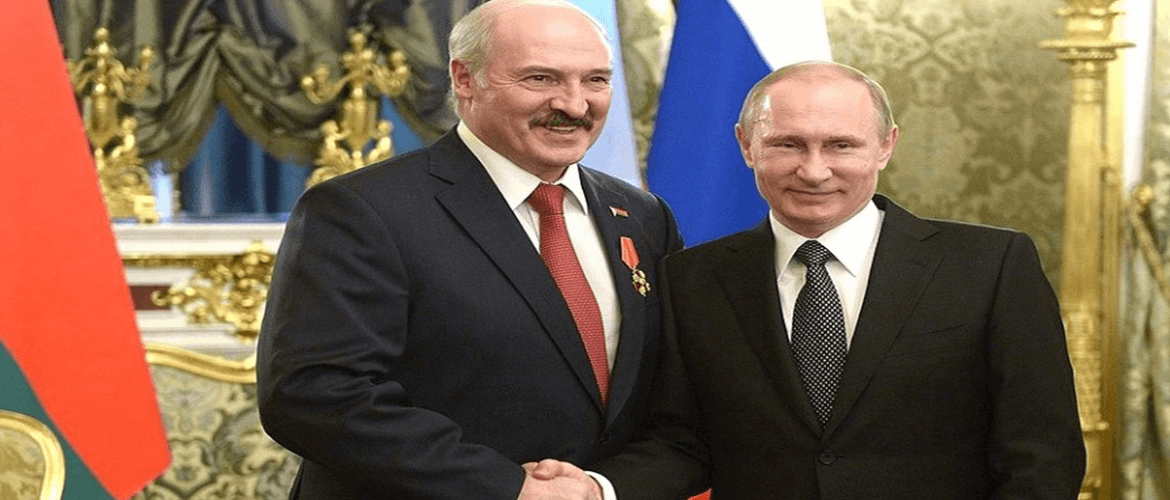Russia's Stakes in Belarus
August 31, 2020 | Expert Insights

Protestors in their hundreds of thousands streamed into the streets of Belarus after President Alexander Lukashenko's was declared the winner with 80 percent of the vote. Few, in any, in this country of 9.5 million people were ready to give credence to this result and allow the 65-year-old Lukashenko to continue his 26-year rule over this small landlocked Central Asian nation, a close ally of Putin's Russia. As police cracked down on the protestors leading to at least four fatalities, the opposition candidate Sviatlana Tsikhanouskaya, a human rights activist and forced to stand for elections in lieu of her jailed husband, fled to neighbouring Lithuania.
There has been widespread criticism, especially in EU countries who have refused to recognise the presidential elections. Russia has declared the result as the popular choice of the Belarusian people and warned external powers from intervention. Mr Lukashenko’s claims of NATO forces building up at Poland's border have been rubbished by the bloc. NATO stated that there is an eye being kept on the situation with no other reaction from their side. Ms Merkel, in an emergency EU meeting, promised sanctions against Mr Lukashenko but ruled out mediating in the internal politics.
The larger question at play is how this situation has come to be, and what is to follow, as protestors refuse to be quelled since the first week of August. Belarus is in a pivotal geographical location — it has borders with the EU and Russia and is also eyed by China, which wants to use it as a gateway to Europe.
A RUSSIAN PROTECTORATE
The role of Russia in the larger post-Soviet Eurasia, cannot be ignored. Russia has propped the Lukashenko regime with cheap Russian energy and subsidies/ loans worth billions of dollars. While Russia favours closer integration, Mr Lukashenko resisted Russian attempts to take control over Belarus assets. In response, Russia sharply scaled down its subsidies, stating that Belarus needs to accept closer economic integration if it wants to receive Russian energy at a discount. This, however, came at a time when Mr Lukashenko vowed to maintain a close alliance with Russia in his election campaign.
Mr Lukashenko’s policy could be termed as ‘Back to the USSR’. The country even re-adopted the flag of the erstwhile Belarusian Soviet Republic, and the security forces are still called the KGB. Re-union with Russia has always been an option with this autocrat who even signed a unification treaty with former Russian President Boris Yeltsin in 1999. But ultimately this was avoided, and he instead borrowed money from the Kremlin. He even played with the idea of joining the European Union.
During the election campaign, Lukashenko raised the bogey of a Russian takeover in case he lost the elections, reminiscent of Crimea, claiming that Russian agents were already in Belarus ready to strike.
Russia, for now, has offered to help Mr Lukashenko with the protests and has asked France, Germany, and the NATO to back off. This could be a sign from Russia to the Belarusian opposition that any post-revolutionary government would need to respect Moscow’s geopolitical lines. This was made amply clear by the Russian Foreign Minister Sergei Lavrov when he declared, “What is happening in Belarus worries us very much . . . No one is making a secret of the fact that this is about geopolitics, the fight for the post-Soviet space.”
Within Russia, opinions on the issue are, however, split. Though state TV has been likening the Belarus unrest to Ukrainian or Georgian lines, print media, including pro-Kremlin publications, has been critical of Mr Lukashenko. Russian journalists beaten up by OMON (special police units) have made news and shocked even citizenry accustomed to repression of dissent. Multiple Russian MPs have come out in support of the Belarusian protesters.
All of this suggests direct intervention may not be on the cards. Though Belarus is strategically vital to Russia, to ordinary Russians, it does not come close to the emotional or cultural significance of Crimea.
A CENTRAL ASIAN PIVOT
The protests in Belarus resemble Ukraine’s 2014 Revolution of Dignity, where pro-Russian President Viktor Yanukovych was ousted from power. Yet, there are differences between the two. For one, Belarus is a voluntary ally of Russia. Mr Putin annexed the Crimean Peninsula in 2014 after the country took a pro-Western stance, and Belarusians tend to be pro-Russia. In Ukraine, the economy was controlled by rival groups of oligarchs who sponsor politicians, while in Belarus, all the power rests with Mr Lukashenko.
Belarus is also part of the Collective Security Treaty Organisation (CSTO), a six-country military alliance headed by Russia. Though not as closely knit as NATO, it is made up of Armenia and three Central Asian republics. Comparing the situation to Armenia, where the pro-Russia head of government was replaced by a presumably more Western-oriented politician in the 2018 Velvet Revolution, could be more of a parallel. Today, Prime Minister Nikol Pashinyan of Armenia, who used to be the leader of the protest movement, is one of Mr Putin's close allies.
When the situation so demands, Russia can be flexible towards its junior partners and has, on various occasions, accepted, if not facilitated, power transitions in Central Asia. It accepted the public deposing of presidents in Abkhazia in 2014 and 2020, and in 2011 in Transnistria instead of its own hand-picked candidate.
ASSESSMENT
- The EU would be well placed to listen to the Belarusian protesters, while not inserting an agenda of its own. Demands issued at the wrong time may only strengthen Mr. Lukashenko in Moscow’s eyes. However, with the protest movement being largely disorganised and virtually leaderless, there is the chance of it fizzling out, with no transition of power taking place. This would keep Mr. Lukashenko at the helm again.
- There could be more interference from Russia to suppress the revolts on Mr. Lukashenko’s call, leading to greater integration with the Kremlin.








Comments